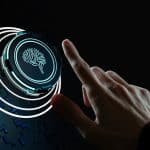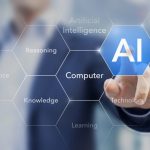Reacting with confidence to a new Trojan horse cyber threat

It’s the sophisticated technology that enables the virtual assistant on your kitchen counter, the recommendation engines on your favorite streaming services, and so much more -- and there’s new evidence hackers can use it as a Trojan horse to deliver malware. Because this technology is increasingly embedded not just in your movie nights, but critical industries from healthcare to energy and banking, its newly understood vulnerability is grave news.
But do we tear it out by its roots? Isolate it? No. Artificial intelligence is too important for that -- particularly, ironically enough, in cybersecurity defense. We have no choice but to confront the Trojan horse gambit and block it.
Power in people: How human capital will determine tech success

According to the Economist, one of the most significant outcomes of the pandemic will be "the infusion of data-enabled services into ever more aspects of life." We were already expecting a transition to digital transformation thanks to technological advancement, dubbed the "fourth industrial revolution".
However, following on from the pandemic which forced countless businesses to switch to remote working virtually overnight, we expect digital transformation to continue to be adopted on a larger and more rapid scale -- becoming an even more prominent objective for organizations in the future.
How AI-as-a-Service is perfectly poised to meet next-era production's ramp-up & capacity challenges

Manufacturing and the science of materials are evolving quickly, so the rate of new products and product variations industrials put into the world is increasing. This evolution also means process parameters, which circumscribe the making of things, are proliferating. Meanwhile, the quality metrics of products and components have become more refined than ever before.
As a by-product, industrial equipment sensors generate an abundance and complexity of data far beyond the reach of statistical process control -- let alone human capacity. Semiconductor engineers, for example, must contend with petabytes of data daily. And they do so from wafers with chip architectures fabricated to accommodate hundreds of millions of transistors per square millimeter.
Transparency, regulation and convergence with 5G -- AI predictions for 2022
'Computer Vision' teams struggle with training data putting projects at risk

The field of Computer Vision -- which looks at how computers can understand digital images or videos -- is a relatively new one, but like any branch of AI it relies on data to train systems effectively.
Synthetic data specialist Datagen has released a new report looking at training data in CV projects and finds that it has become a significant stumbling block.
Why hybrid is the future of AI [Q&A]

Artificial intelligence, along with machine learning, deep learning and natural language understanding are increasingly being combined to create a hybrid approach.
Harnessing a range of techniques in this way helps data scientists to produce the best results. We spoke to Luca Scagliarini, chief product officer at expert.ai to find out more about how this approach can work and why we can expect to see it becoming more common.
6 industries that will be affected by AI in 2022

Artificial intelligence is shaping the future of how people work, live, and play, and its impact will grow in 2022. Just as robotics affected certain industries more than others, artificial intelligence (AI) will be at the forefront of change in a few particular industries going into 2022. Some of these industries may even come as a surprise.
A recurring theme when it comes to the growth of AI is its value for augmenting the skills of humans or filling in their gaps without actually replacing human workers. What many industries are finding is that they still need human employees, but AI can help them work safer, faster, and smarter. These six industries will be at the center of the AI ripple effect in the year ahead.
Breaking bias -- ensuring fairness in artificial intelligence [Q&A]

Artificial intelligence is creeping into more and more areas of technology, increasingly becoming the basis for commercial and other decisions, but bias can find its way in to AI systems and lead to results that are neither fair nor objective.
To prevent bias in AI businesses need to understand the different types of bias that can occur and know what’s needed to address each of them. We spoke to Alix Melchy, VP of AI at Jumio, to find out about the problems AI bias can cause and what enterprises can do about them.
6 techy ways to entice new talent during The Great Resignation

If you've been paying attention to the news lately, you know that many people are choosing to leave their jobs for various reasons. This period is being coined as "The Great Resignation."
Employers across all sectors are looking for new ways to gain the attention of potential employees -- but it'll take more than just posting a couple of positions on online job boards. Some recruiters are even turning to artificial intelligence (AI) to improve their recruiting processes and make them more efficient.
Using AI to deal with ransomware attacks [Q&A]

Ransomware is a particularly heartless -- though undeniably lucrative -- endeavor. Criminals target schools, vital infrastructure, and even patient records in attempts to cash in. As a result, many security professionals put defensive ransomware strategies at the top of their to-do list.
Understandably, most of these strategies start with measures that minimize the footholds attackers can find. Checking inbound emails for ransomware payloads, giving users training on safe internet usage, and monitoring the network for suspicious activity are essential elements of an effective anti-ransomware strategy.
Conversational AI and customer experience [Q&A]

These days when you contact a company online it can be hard to know if you're dealing with an actual person or with an AI bot.
Clearly AI has a role to play in automating repetitive tasks and answering straightforward queries. But can it really have a wider role to play in improving customer experience? We spoke to Derek Roberti, VP of technology at Cognigy, a global conversational AI platform provider, to find out.
How businesses can keep colleagues and customers close

While the past 18 months or so have focused on providing business continuity in the midst of a crisis, the next year is set to bring another shift. As organizations around the world gear up to return the office -- at least in a hybrid capacity -- businesses need to make a seminal decision: should they go back to old ways of working? Or can firms take this opportunity to fundamentally review their practices and reduce the inevitable complications that have arisen throughout the pandemic?
Given that firms have experienced some teething problems implementing new approaches, I would urge organizations to take the latter course. In a world where workplace communication between customers and colleagues is becoming increasingly frayed, now is the perfect time for businesses to rethink whether their chosen solutions fit their needs.
Use AI to beat the bad guys

As we enter the back half of 2021 there are two top cybersecurity headlines, and they’re both sobering. One, even large organizations now suffer cyberattacks as a near-daily fact of life -- not just mid-sized businesses with resource-strapped SOCs (Security Operations Centers), which historically felt the most pressure.
Two, prevention-forward defense strategies no longer inspire confidence. Malicious, innovative use of AI to find and exploit fruitful attack vectors sees to that. AI has rendered many old go-to defenses less effective, namely firewalls and SIEM (security information and event management) solutions. The third headline, however, is cause for optimism. AI works for cyber defense, too. In the current environment, if you are not leveraging AI to defend your organization, it isn’t optimally defended. Period. I see AI as our greatest ally to create a secure future.
How Artificial Intelligence is set to revolutionize industries

There’s no denying that technology has been the key to evolution for almost every industry. From transport to gaming, sports to healthcare, improvements to processes and capabilities have been attributed to rapidly innovating technology. This is particularly prominent in the field of artificial intelligence (AI). What was once reserved for sci-fi movies is now actively a part of our everyday lives, and it’s set to pave the future -- perhaps autonomously!
In this article, we take a look at how AI is set to ignite several key industries.
6 developments in autonomous tech, coming soon

As more industries find themselves searching for viable solutions to common problems, they look towards automation. The concept of artificial intelligence (AI) has evolved over the years, and new applications for automation are emerging. It seems as though the world is moving towards automation rapidly, and industries will need to adopt this technology to stay ahead of the competition.
Continue reading to learn more about six autonomous technologies being developed that will change the way industries operate. They will contribute to higher levels of efficiency and productivity by complementing existing technologies.
Recent Headlines
BetaNews, your source for breaking tech news, reviews, and in-depth reporting since 1998.
© 1998-2025 BetaNews, Inc. All Rights Reserved. About Us - Privacy Policy - Cookie Policy - Sitemap.
